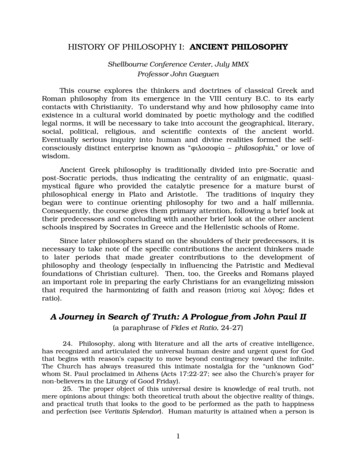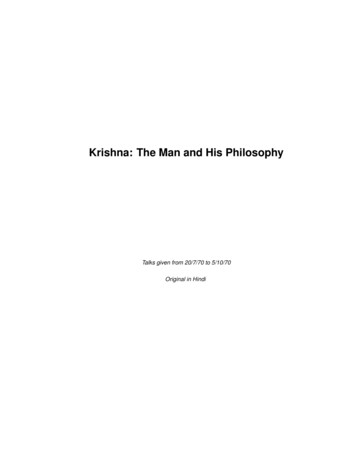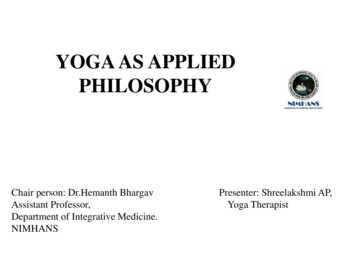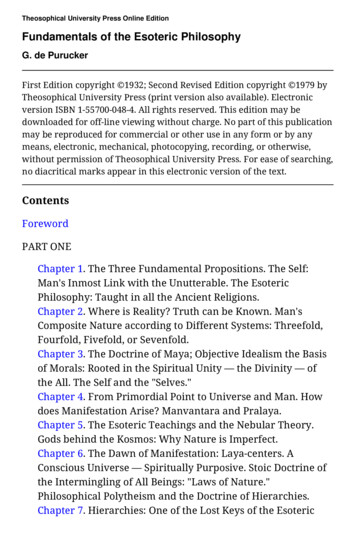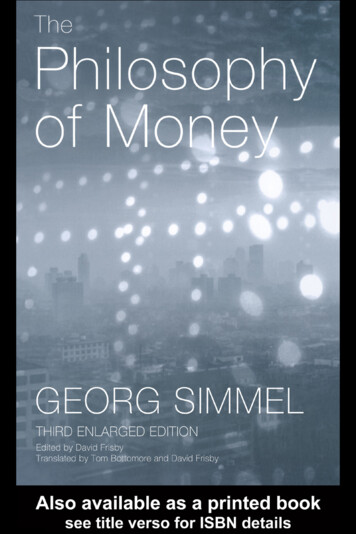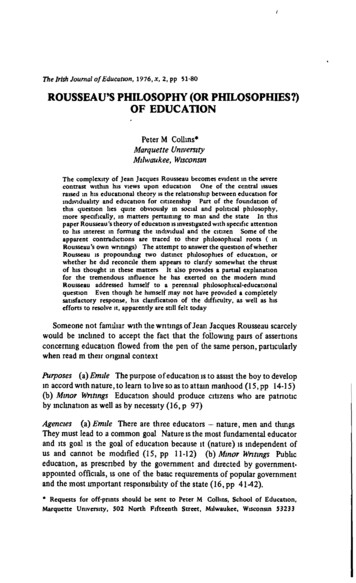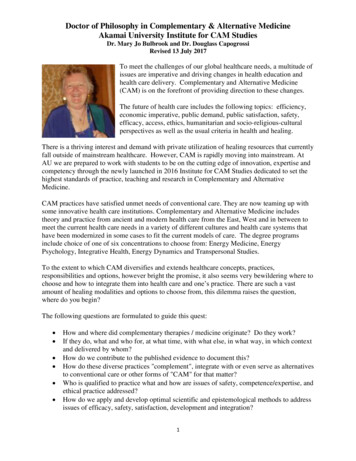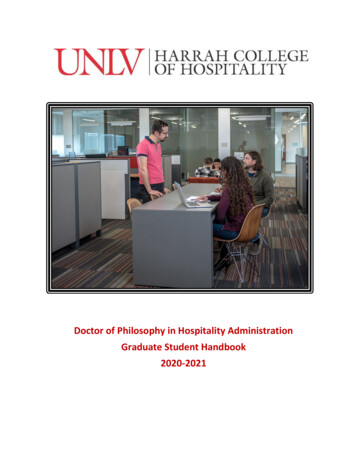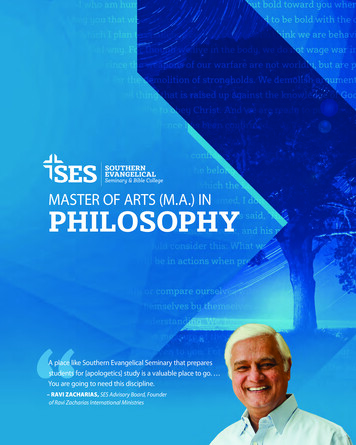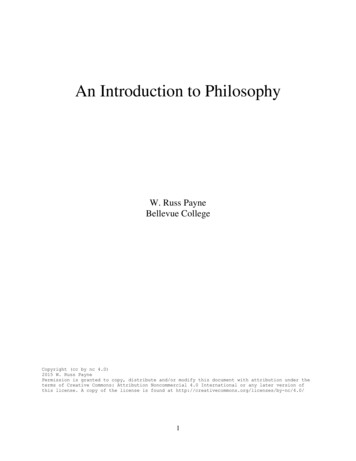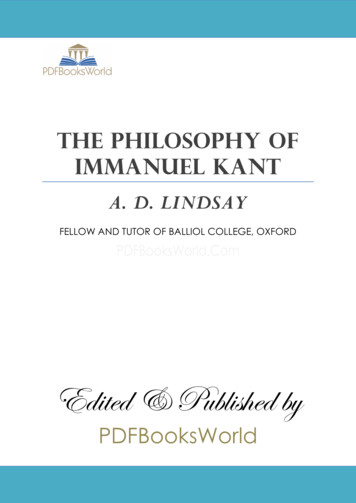
Transcription
THE PHILOSOPHY OFIMMANUEL KANTA. D. LINDSAYFELLOW AND TUTOR OF BALLIOL COLLEGE, OXFORDEdited & Published byPDFBooksWorld
Publisher NotesThis eBook is designed, edited and published by PDFBooksWorld andcan be accessed & downloaded for personal reading by registeredmembers of PDFBooksWorld at http://www.pdfbooksworld.com. Thoughthe text, illustrations and images used in this book are out of copyright,this unique PDF formatted edition is copyrighted. Readers of this bookcan share and link to pages of our website through blogs and socialnetworks, however the PDF files downloaded from our website shall notbe stored or transmitted in any form for commercial purpose.Disclaimer: This edition is an electronic version of a public domain book, which was originally written many decades ago. Hencecontents found in this eBook may not be relevant to the contemporary scenarios. This book shall be read for informative andeducational purpose only. This eBook is provided ‘AS-IS’ with no other warranties of any kind, express or implied, including butnot limited to warranties of merchantability or fitness for any purpose.Original Publication NotesLONDON: T. C. & E. C. JACK, LTD.35 PATERNOSTER ROW, E.C., & EDINBURGHNEW YORK: DODGE PUBLISHING CO.1
Table of ContentsFOREWORD . 3CHAPTER I . 4THE IDEA OF CRITICISM . 4CHAPTER II . 17KANT'SSTATEMENTOFTHEPROBLEM.SYNTHETIC A PRIORI JUDGMENTS . 172
FOREWORDThere is a story that Schopenhauer used to begin his lectures onKant by saying: "Let no one tell you what is contained in theCritique of Pure Reason." The writer of this little book hopesthat no one will imagine that he has disregarded this warning.There are no short-cuts to the understanding of a greatphilosopher, and the only way to appreciate the greatness of aphilosophic system is to study the philosopher's own writings.All that the writer of a book like this can hope to do is topersuade others to undertake that study by interesting them inthe problems with which it deals, and by offering a fewsuggestions which may help to an understanding of it. I havesaid nothing about the numerous other works which Kantwrote. For the three Critiques contain his system, and theunderstanding of that is all-important.3
CHAPTER ITHE IDEA OF CRITICISM"It is a difficult matter," says Heine, "to write the life history ofImmanuel Kant, for he had neither life nor history. He lived amechanically ordered, abstract, old bachelor kind of existencein a quiet, retired alley in Königsberg, an old town in the northeast corner of Germany." The times he lived in were stirringenough. He was born in 1724, and died in 1804. He livedthrough the Seven Years' War that first made Germany anation, he followed with sympathy the United States War ofIndependence, he saw the French Revolution and the beginningof the career of Napoleon. Yet in all his long life he never movedout of the province in which he was born, and nothing wasallowed to interrupt the steady course of his lecturing, studying,and writing. "Getting up," continues Heine, "drinking coffee,lecturing, eating, going for a walk, everything had its fixed time;and the neighbours knew that it must be exactly half-past fourwhen Immanuel Kant, in his gray frock-coat, with his Spanishcane in his hand, stepped from his door and walked towards thelittle lime-tree avenue, which is called after him thePhilosopher's Walk." "Strange contrast," reflects Heine,"between the man's outward life and his destructive, worldsmashing thoughts." As the political history of the eighteenthcentury came to an end when the French Revolution spilledover the borders of France and drove Napoleon up and downEurope, breaking up the old political systems and inauguratingmodern Europe, so its opposing currents of thought weregathered together in the mind of a weak-chested, half-invalid4
little man in Königsberg, and from their meeting a new era inphilosophy began.There are some philosophers to whom truth seems to comealmost unsought, as an immediate authoritative vision. Kantwas not one of these. His greatest work, the Critique of PureReason, was conceived when he was forty-eight, and publishedin 1781, when he was fifty-seven. It was the outcome of half alifetime's patient study and thought. Heine says of him: "Hewas the perfect type of the small shopkeeper. Nature had meanthim to weigh coffee and sugar, but fate willed that he shouldweigh other things and put a God on his scales, and hisweighing was exact." The sneer is unjust, but there is somethingin the simile; for Kant's philosophy was a kind of taking stock, asurvey of the great movement of thought from the time whenthe Renaissance and the Reformation made thought free, anattempt to estimate the achievements of the new sciences, todeal with their conflicting claims and ideals and say what it allcame to. In Kant modern science, which began with Descartesand Galileo, first became conscious of itself.This taking stock Kant called Criticism. His great books areall called Critiques--the Critique of Pure Reason, the Critique ofPractical Reason, the Critique of Judgment. He called hisphilosophy the Critical Philosophy or Critical Idealism.Essential to an understanding of Kant is an understanding ofwhat he meant by criticism, and why he opposes it todogmatism and scepticism; for the necessity and possibility ofsuch a criticism was his great philosophical discovery. We havecalled Kant's work a survey of the achievements of the thoughtof his times, but it was very much more than that, and has amuch more universal significance than could belong to anyhistory of the thought of one epoch. For these achievements ofthought, though great, were conflicting and partial. Theycontrasted with failure and barrenness in other directions, and5
they seemed to be due to different methods. This success ofthought in one direction and its failure in another, and thisuncertainty about the true method of science, were problemswhich at once presented themselves to an impartial observer,and Kant held that they could be answered only by taking stockof actual attainments, and by criticism of the powers and rangeof human thought in general.The problem that presented itself to him will be understoodif we look for a moment at the history of thought in theseventeenth and eighteenth centuries. One thing that Kantnoted in it was the steady and sure progress of physics. "Withthe experiments of Galileo and Torricelli," he says in the prefaceto the second edition of the first Critique, "a new light flashedon all students of nature." The continued success of physicsmeant the successful application of mathematics to the concreteworld, and along with it a remarkable development ofmathematics itself. This sudden success inspired men to feelthat they had discovered a way of explaining the universe; theycontrasted the fertility of their new methods with thebarrenness of scholastic speculation in morals and theology;they felt confident that all that was wanted to the attainment ofcertain knowledge in all spheres of human interest was theextension of these methods. If men would only set to work theright way, they were sure that all difficulties would beovercome; and, by reflection upon their own success, theyhoped to explain what the right way was.Unfortunately this was not easy, for the advance from puremathematics to physics, from a study of the nature of puremathematical conceptions to an inquiry into the laws of fallingbodies, implied a change whose nature was not clear to the menwho had themselves made the advance. A conflict arosebetween those who thought more of the fact that knowledge, tobe certain, must be capable of mathematical expression, and6
those who thought more of the basis of experiment andobservation on which the new sciences depended, whoremembered that these sciences began when Galileo, instead ofthinking in the abstract how bodies ought to fall, droppedbodies of different weights from the top of the leaning tower ofPisa and observed what actually happened. Descartes was thegreat representative of the first school. He began by insisting onthe difference between mathematical truth which could be, ashe said, clearly and distinctly conceived, and ordinary opinionabout things which was full of guesswork and imagination.Scientific knowledge was possible, he thought, only byapprehending the real or primary qualities of things which weremathematical, in contradistinction to their secondary qualities-their colour, smell, &c.--which were less real. Thence he cameto think that the real world was mathematical in nature, like ahuge, intricate geometrical figure. The elements of mere fact, inour present knowledge, its dependence on observation andexperiment, he thought of as temporary defects which theprogress of science would remove. What we ordinarily callperception, indeed, in the sense of awareness of things in timeand space, was described by Descartes' successors as confusedthinking. Our knowledge of the world would, it was hoped,become a vast mathematical system, all the detail andcomplexity of which would be rigorously deducible from a fewcentral truths.This general way of thinking was called Rationalism. Kantordinarily calls it Dogmatism. It was attacked by otherscientists for its view of the nature of space and time. No onewho reflects at all can fail to distinguish a difference betweenthe way in which we see the truth of a geometrical proposition-that, e.g., the three angles of a triangle are equal to two rightangles--and the way in which we judge that such and such afigure drawn on a board is a triangle, or make judgments about7
the way in which things are actually arranged in space orsucceed in time. Judgments of the latter kind involve words like"here" and "there," "now" and "then," words which are all akind of pointing. It seems impossible from considering thenature of a triangle to deduce why any existing thing should becalled triangular, and all statements about the position of thingsin space and time seem to be derived not from a considerationof the general nature of space and time, but from observation.Now the science which had made perhaps the most strikingprogress in the time we are speaking of, physical astronomy,involved any number of statements about the position of bodiesin space. The Rationalist school admitted this, but held thatthat was due to the fact that science was not sufficiently thoughtout. In time, they hoped, all statements about position in spacewould disappear. To think of things in spatial order was tothink confusedly. Newton, on the other hand, held that spacecould not be explained away, that astronomy implied anabsolute space in which things existed, that the spatial relationsof things could not be explained by the nature of the thingsthemselves, but only by a reference to absolute space in whichthey all were. This meant that observation or perception wassomething of which you could not hope and should not wish toget rid, and that an ideal of knowledge in which all appliedmathematics should have been transmuted into puremathematics was a vain one. Astronomy implied both mereobservation and apprehension of necessary relations. Here wasa science which seemed to employ both methods together.Galileo, in fact could not have made his discovery withoutobservation but men had observed bodies falling for ageswithout discovering the laws of motion. Further, the laws ofmotion, once discovered, made men in some degreeindependent of observation, made them able to say of actual8
concrete things not only what had happened, but what musthappen.Such difficulties as these arose from reflection on the aimsand methods of the mathematical sciences, but there was muchgenuinely scientific inquiry in the seventeenth and eighteenthcenturies, which showed no signs of taking mathematical form;chemistry and biology, for example, were still almost entirelyempirical. Furthermore, thinkers were not concerned withscience alone. These centuries saw a great revival of interest inspeculation on human affairs, history, politics, morals andtheology. England, which was the home of free discussion onquestions of politics and morals, and where, more than in mostother countries, there was free discussion on theology, becamealso the home of empiricism. The empirical movement, indeed,drew much of its impetus from a reaction against Hobbes, theonly great English thinker who unhesitatingly applied themechanical and deterministic assumptions of the new sciencesto morals and politics, and arrived by this uncompromisingmethod at results so obviously repellent that no man of anysense could accept them, and so consistently presented thatthey could not be refuted save by a refutation of theassumptions upon which they were founded. Such a refutationwas, in fact, undertaken by Locke, the first great representativeof the empirical school. He was interested alike in the moreobviously empirical sciences of chemistry and biology, and inpolitics. He was not a very consistent or systematic thinker, buthe had other gifts perhaps as valuable. He was a man of greatcommon sense and breadth of view, and was able thereby totake a conspectus of the general situation in the various spheresof inquiry, to notice the obvious differences in our knowledge ofmathematics, of chemical and biological fact, and of theology,and to see that these constituted a problem. We find in him thefirst statement of the necessity of philosophical criticism. It is9
contained in his account of the origin of the Essay concerningHuman Understanding. "Were it fit to trouble thee with thehistory of this Essay, I should tell thee that five or six friends,meeting at my chamber, and discoursing on a subject veryremote from this" (they were discussing the "principles ofmorality and revealed religion"), "found themselves quickly at astand, by the difficulties that rose on every side. After we hadawhile puzzled ourselves, without coming any nearer aresolution of those doubts which perplexed us, it came into mythoughts that we took a wrong course; and that, before we setourselves upon inquiries of that nature, it was necessary toexamine our own abilities, and see what objects ourunderstandings were, or were not, fitted to deal with."We have here the same general starting point of inquiry aswe shall afterwards find in Kant. There are certain, obstinatepuzzles which we meet with in discussion which can only besolved by going back and inquiring into the nature ofknowledge and the powers of our minds. Unfortunately, as Kantpoints out, Locke went the wrong way about his task. Hedescribes it as "a plain historical inquiry." He thought that hehad only to look into his mind and see what was in it, as hemight open a door and look into a room. The result is that hethinks of all knowledge as consisting simply in looking at whatis present to the mind. We can know, therefore, whatever canbe present to the mind, and the limitations of knowledge arediscovered by asking what can be so present to the mind. Theconclusions to which he comes as to different spheres of humaninquiry are roughly these: We can have knowledge ofmathematics because there we are concerned only with ideaspresent to the mind, and with noting their agreement anddisagreement. We can have no knowledge of such questions asthe immortality of the soul, or the nature of spirits, for they arebeyond our observation. As regards existing things, we can have10
knowledge of them, in so far as they are present to our minds,and no further. The meaning of "present to the mind" was neverclearly analysed by Locke; but he meant, for example, that wecan observe that an object which is yellow, and which we callgold, is also heavy, and can be dissolved by Aqua Regia, but wecannot say why that is so, and we ought not, on Locke'sprinciples, to have any ground for supposing that thesequalities will go on co-existing.The element of truth in Locke's position is this. When we areexamining concrete things like pieces of gold or any chemicalsubstance, we find in them a number of varying qualities whoseconnection we cannot understand. We do not know why a metalof a certain specific gravity should also be yellow; we can onlynote the fact. Hence in chemistry our method must be quitedifferent from the method of mathematics. In mathematics westart from the definition, and we can understand the connectionof the properties of a geometrical figure, and see that they allfollow necessarily from the definition. But in sciences likechemistry a definition does not take us any further; we can onlyfind out the properties of a substance by observation andexperiment. Locke explains this difference by saying that in theformer case we are only concerned with agreement among ourown ideas, in the second place we are concerned somehow withthings outside us. This explanation will not stand. It is not truethat mathematics is simply analysis of an arbitrary definition,as Locke seems to suggest. It involves construction, or, as Kantcalls it, synthesis. It is a process of discovering new truths.Secondly, our statements about concrete objects are notstatements of qualities we see co-existing at the moment. Theyare statements about all gold or all men; in other words, theyare universal, and Locke found it impossible to explain theuniversality of such propositions--what we mean, e.g. when wetalk about the nature of gold or of man, not of this gold or this11
man that I see before me. Lastly, this distinction ofmathematics and the empirical sciences by a distinction ofspheres does not allow, as we saw, for a science like astronomy,which builds on mathematics and yet applies to the concreteworld.These difficulties were seen more clearly by Hume, at oncethe greatest and the most thorough-going of empiricists. He cutthe knot in regard to mathematics by asserting that geometry,just because it has clearly an application to the existing world,had no more certainty than any other empirical inquiry, whilearithmetic and algebra, he agreed, were certain, but confinedtheir application to the sphere of our own ideas. Both positionsare almost obviously inconsistent with the facts. In consideringthe nature of our judgments about concrete existences he raiseda more profound problem. All such judgments, as he said, implythe principle of causation, or of what is called, in modern times,the principle of the uniformity of nature. That principle we takewith us in our investigation of the existing world. Yet, as Humesaw, we do not observe causes; we only observe succession andchange. We seem, therefore, to put into the world we see anecessity and uniformity which the observed facts do notwarrant. How is this to be explained?Hume's answer is ingenious. The principle of causationcannot be rationally justified, and the necessary connection wepredicate of changes in the outside world is not in the things; itis only a feeling in ourselves, and is the result of custom. Afterseeing the same succession several times, we come somehow tofeel differently about it, and that feeling of difference weexpress by saying that we have before us an instance not ofsimple succession, but of cause and effect.This is not the place to discuss the difficulties of Hume'sposition; it is enough to notice how entirely passive it makes themind, and how alien such an explanation is from the spirit of12
inquiry and discovery. If cause is simply the effect of custom onthe mind, then the facts either produce that effect or they donot. In neither case is there anything to find out. But thescientist, in investigating causes, however strongly he may holdthat he has to observe the facts, knows also that he has aproblem
Immanuel Kant, for he had neither life nor history. He lived a mechanically ordered, abstract, old bachelor kind of existence in a quiet, retired alley in Königsberg, an old town in the north-east corner of Germany." The times he lived in were stirring enough. He was born in 1724, and died in 1804. He lived
